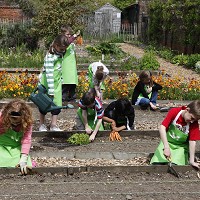Smallholders Handbook Part 5

Here is our fifth instalment about joining the Good Life and living off the land with a sustainable smallholding.
At BigBarn we would love to promote thousands of profitable smallholdings on our UK Food Map, reconnecting people with where their food comes from and helping build inclusive, sustainable, communities around food.
To help here is the fifth of 12 extracts from Lorraine Turnbull’s book The Sustainable Smallholders’ Handbook
VOLUNTEER WORKERS
In the early days on our smallholding I learnt a great deal by volunteering to work for board and lodging on established smallholdings, and for local farmers in order to learn both particular skills (such as lambing) and to learn what systems they found most efficient, and in time I was able to pass on my experience to other volunteers.

I love food I have grown
We registered with HelpX and for two years welcomed people of all ages from all over the world to come and help us on our smallholding. I’m sure we learnt as much from them as they did from us!
As hosts you need to be realistic about your expectations – you’re not getting a worker who will slave all day every day for nothing! Our volunteers put in four days a week from 10-4; in return they got food, accommodation and on-the-job training, still had time to go and discover Cornwall, and enjoy a not occasional trip to the pub with us.

‘Let’s cook with these mum’
Having volunteers is a privilege and both parties want to enjoy the experience. But there’s a serious side too. Scrutinise every applicant and ask for references, especially if you’re going to allow them in your homes. Get public liability insurance and provide your volunteers with adequate personal protection equipment. Think carefully about what you need them to do, how long their jobs will take, what equipment they’ll need, and what their incentive is.

learning through doing
Before you shove them out to work, ensure that they know what they are doing and how to do it. Tell them where you are in case they need to ask anything, and tell them when break time is. Even if they are slow, let them finish the job. It will give them confidence, especially if you remember to thank them.
Agricultural Colleges often arrange working placements too for students and are a good contact if you are looking for local help.
Tempted? You can read more over the next few months or buy Lorraine Turnbull’s book The Sustainable Smallholders’ Handbook available here